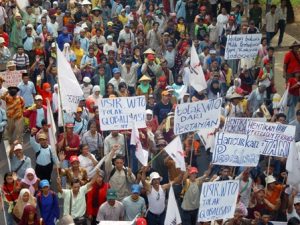Land Rights Crucial for Youth in Asia to be the Leaders of Tomorrow
On the closing day of the Forum, young members of ILC Asia expressed their voice and emphasised the need for their participation in decision-making processes as they are our future leaders.
Indigenous peoples, rural women, youth, nomadic pastoralists, and local communities are the changemakers in ecosystem restoration and conservation. That was one of the important findings from the 2021 Asia Land Forum, organised by the International Land Coalition (ILC) Asia and the Asia Indigenous Peoples’ Pact (AIPP).
ecosystem restoration and conservation. That was one of the important findings from the 2021 Asia Land Forum, organised by the International Land Coalition (ILC) Asia and the Asia Indigenous Peoples’ Pact (AIPP).
In many Asian countries, high youth unemployment rates linked to high levels of landlessness suggest a close correlation with youth poverty and access to land. However, many young people in the region are becoming more aware of their rights and like to encourage a positive change within society.
“As a daughter of farmers, it is my calling to join the agrarian reform movement for young people. I have seen the impact of land inequality in Indonesia; land conflicts have risen, and there are only small plots of land for peasants and family farmers because of palm oil plantations, monoculture plantations, and government-owned forestry plantations. I hope the Asia Land Forum will be the forum for us, young people, to exchange knowledge,” said Lela Sari, a member of the Pasundan Farmers’ Union (SPP) in West Java, Indonesia, who works closely with an ILC member, the Consortium for Agrarian Reform (KPA).
Also Read : Secure Land Rights Critical for Asia’s Rural Communities Threatened by COVID-19
“We need to see young people not just in numbers but as individuals who are capable of making a difference, who can facilitate the process of change and achieve a goal that we are visioning together. The energy of young people and the experience of the elders are what we need to create change,” said Mohsin Khan, a youth rights activist from Ekta Parishad in India and a member of ILC.
In many indigenous communities, young people too haveled the movement for their various rights from the front. Their understanding and awareness of their roles as changemakers are everincreasing.
During the Forum, participants also agreed that secure land rights are central to the livelihoods of local communities in the region. However, governments in Asia still exhibit a lack of recognition of the importance of land. “We clearly see the underreporting of land targets of the 2030 Agenda. What can we do to encourage State parties to report on land? We need to bring the centrality of land in the 2030 Agenda because without land, we cannot eradicate poverty, achieve gender equality, and restore our planet, among others,” said Rukshana Nanayakkara, ILC’s Global Policy and Advocacy Expert.
Gam Shimray, Secretary-General of AIPP ended the Forum by reiterating secure land rights as key to achieving equality. “There can be no peace without land reforms. This is what indigenous peoples stand for. We all stand for undoing the historical injustices. We all stand for land reform.”
This year the annual Asia Land Forum was held virtually from 27 to 29 October 2021 with the theme of Securing Land Rights and Sustainable Development Goals (SDGs). It brought together ILC members and other stakeholders ranging from grassroots organisations, activists, local and international NGOs and researchers, to multilateral organisations and government agencies from the region. The event aimed at developing a common ground of the political, economic, environmental, and social linkages between land governance, food security, poverty, and democracy. By convening all members and key partners of the network, the Forum created opportunities for participants to learn from, and contribute to, land governance successes and to overcome its challenges. The event was divided into a series of thematic sessions co-organised with ILC Asia members. Aligning with this year’s theme, the discussions will focused on the importance of land rights in the SDG 2030 Agenda, in particular, to address social and economic inequality, protect land and environmental rights defenders, and mitigate climate change.
